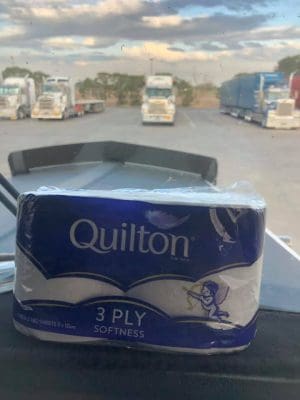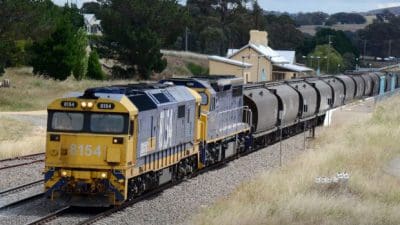
Trucks carrying grain are being issued with this permit when entering Queensland amid COVID-19 restrictions which are making it hard for truck drivers to find places to have a sit-down meal and a shower. Photo: Rowan White
IF YOU ignore the problem of closed amenities at roadhouses, COVID-19 is having a minimal impact on the transport of grain across borders as Australian states restrict movements to limit the spread of the virus.
UPDATE: The National Road Transport Association on 31 March advised that roadhouses, dedicated truck-stop facilities and truck-driver lounges where social distancing and additional hygiene measures can be maintained have been granted exemptions to remain open. This means drivers will be able to use showers and toilets and have sit-down meals while on the road.
Sources in rail, road and sea freight have all told Grain Central that the closure of Queensland’s and South Australia’s borders this week has not disrupted the flow of grain to feed and flour mills in New South Wales and Queensland.
Since late 2017, Queensland and NSW have been volume importers of grain from southern Australia to fill their requirements.
While good rain has fallen in many parts of both states, they are both relying on interstate grain until — weather permitting — new-crop becomes available.
Road
Daltrans Bulk Haulage principal Dallas Kropp is based at Dalby on the Darling Downs, and with the company’s fleet plus sub-contractors is operating up to 15 trucks.
They carry mostly grain in northern NSW and southern Queensland, and Mr Kropp said the implementation of Queensland border checks has not been a problem.
“Trucks have been crossing the border coming from Moree to feedlots, and at Mungindi, and at Hebel coming from Walgett,” he said.
“There was some anxiety around it from the drivers, but it’s not a topic now.
“Because grain is an essential service, there are no problems getting across the border.”
Trucks crossing the border are issued with a Queensland Government permit which must be displayed in the cabin.

Toilet paper for sale to travelers has been in hot demand at roadhouses like the Caltex at Goondiwindi as well as at supermarkets. Photo: Rowan White
Mr Kropp and others have said driver services were becoming a problem as roadhouses looked to manage tougher cleaning requirements in the face of COVID-19.
“The 24-hour servos are still selling fuel and doing takeaways, but the amenities blocks are being closed because it looks like they don’t have the staff to clean them to the standard required now that coronavirus is around,” he said.
“Border crossings are a walk in the park, but the showers and amenities not being available is a problem.”
Mr Kropp said the closure of amenities at some roadhouses had become evident this week, and businesses like Daltrans might have to work around them.
“Personal hygiene is even more critical at this time, and what we might have to look at doing is getting drivers to refuel at our depot in Dalby and go home for a shower.
“It’s not the most efficient way of doing things, but that’s what we might have to do.”
Mr Kropp said charging for showers might be an option for roadhouses wishing to cover the additional cost of cleaning to standards required to minimise the spread of COVID-19.
“We’d pay a few dollars for that service, and one owner-driver is even talking about having a gas-heated shower installed in his truck.
“These might be the lengths we have to go through to get through the next few months.”
Owner-driver Rowan White said while takeaway food was still available on the road, places to sit down and have a meal had become limited due to the COVID-19 restrictions.
“I’ve gotten by this week for showers and meals, but I’m on a different route next week.
“Things could be challenging.”
Rail
Freight on Rail Group (FORG) of Australia chair and Pacific National (PN) chief executive officer Dean Dalla Valle said federal and state governments and major operators had moved quickly to ensure much-needed rail-freight services could continue amid COVID-19 responses.
“A single-stacked 1800-metre interstate goods train can haul 260 shipping containers, thereby helping to free up hundreds of truck drivers each week to focus on delivering goods and products…where consumers need shelves restocked,” he said.
“To put this in perspective, a single shipping container can hold approximately 25,000 toilet paper rolls, 55,000 food cans or 1500 cases of beer.”

Rail forms an important part of the grain-transport network. Photo: Pacific National
Mr Dalla Valle said rail had the benefit of operating within secure railway corridors and facilities prohibited to members of the general public.
“In recent weeks, rail freight operators have implemented strict hygiene protocols at depots, terminals and maintenance facilities, including social distancing, to protect the health of essential staff,” he said.
Southern Shorthaul Rail (SSR) and PN have been bringing most of the grain east from South Australia to railheads as far north as Moree in northern NSW during the current drought.
SSR director Jason Ferguson said South Australia’s closing of its border to non-essential services has not hindered grain trains, which are supplying more wheat than normal to flour mills as they answer retail’s coronavirus-driven call.
“It’s the busiest it’s ever been, and we’re working around that.
“We’re working with South Australian Government officers and police, and we’ve drafted cross-border directives around train crews which fit in with where we park the train at Broken Hill.
“It’s business as usual on rail.”
Mr Ferguson said SSR’s two-person driving teams were being kept together wherever possible to minimise the risk of COVID-19 in one staff member impacting others.
“We’re also making sure handles in the cabin are being cleaned all the time, and getting incoming crew to come in through a different door to the one the outgoing crew has just used.”
Sea
The Port of Brisbane is the biggest receival point for interstate grain in Queensland.
It is five sailing days from Port Lincoln, and up to 10 from WA ports.
Maritime Safety Queensland (MSQ) general manager Angus Mitchell said Queensland had set the most rigorous protective measures of all states for managing COVID-19 for all vessels arriving in our ports.
Apart from some specific location-of-origin exemptions, a 14-day quarantine period and a rigorous health protocol questionnaire exists for all vessels arriving at Queensland ports.
On 23 March, MSQ adopted a two-port policy, meaning restrictions at the Port of Brisbane would be consistent with the Federal Government advice on receiving foreign vessels into Australia.
Under this approach, vessels such as domestic grain carriers can be received into the Port of Brisbane without any time restrictions provided safeguard measures are maintained in line with the ABF Commercial Vessel Advice issued on 20 March.
“Exemptions are based on a detailed risk-based process and verification of ‘in-country’ mitigation measures,” he said.
“Any exemptions remain open for amendment should circumstances or health advice change.”
Grain Central: Get our free daily cropping news straight to your inbox – Click



HAVE YOUR SAY